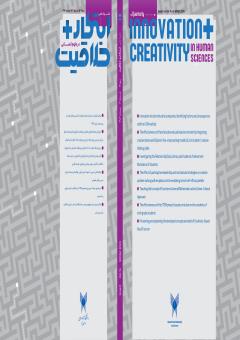بررسی رابطه سواد داده با انگیزش پیشرفت تحصیلی دانشجویان
محورهای موضوعی : خلاقیت و نوآوری از جنبه‏های روان‏شناختی، علوم شناختی، علوم تربیتی و آموزشی (خلاقیت شناسی روان‏شناختی، خلاقیت شناسی پرورشی)
مروارید تاسا
1
![]() ,
صالح رحیمی
2
*
,
غلامرضا حیدری
3
,
صالح رحیمی
2
*
,
غلامرضا حیدری
3
![]()
1 - کارشناس ارشد علم اطلاعات و دانش شناسی، دانشگاه رازی، کرمانشاه، ایران.
2 - دانشیار گروه علم اطلاعات و دانش شناسی دانشگاه رازی، کرمانشاه، ایران.
3 - دانشیار گروه علم اطلاعات و دانششناسی، دانشکده علوم اجتماعی، دانشگاه رازی، کرمانشاه ، ایران.
کلید واژه: استفاده از داده¬ها, انگیزش پیشرفت تحصیلی, دانشجویان دانشگاه رازی, سواد داده¬, مدیریت داده¬ها.,
چکیده مقاله :
هدف: هدف پژوهش تعیین رابطه¬ی سواد داده با انگیزش پیشرفت تحصیلی دانشجویان دانشگاه رازی است. روش¬شناسی: پژوهش حاضر از نوع کاربردی و به روش توصیفی همبستگی انجام گرفته است. جامعه¬ی آماری، دانشجویان دانشگاه رازی در سال تحصیلی 1401-1402 (11080 نفر) هستند. براساس جدول کرجسی و مورگان حجم نمونه با روش نمونهگیری تصادفی طبقهای به تعداد 371 نفر انتخاب شد. جهت گردآوری داده¬ها از پرسشنامه سواد داده و انگیزش پیشرفت تحصیلی استفاده شد. برای تجزیه و تحلیل داده-ها از آزمون¬های آمار استنباطی و توصیفی استفاده شد. یافته¬ها: بین سواد داده با نمره کل انگیزش پیشرفت تحصیلی رابطه¬ی مستقیم و معناداری وجود دارد. همچنین تمامی مؤلفه¬های سواد داده با مؤلفه¬ی انگیزش درونی رابطه¬ی مستقیم و معناداری دارند. بیشترین مقدار همبستگی مؤلفه¬های سواد داده با انگیزش پیشرفت تحصیلی مربوط به مؤلفه¬ی درک داده¬ها است. همچنین مقطع تحصیلی و سن با متغیر سواد داده ارتباط معناداری دارند. اما بین جنسیت، ترم تحصیلی، رشته¬ی تحصیلی و دانشکده¬ی محل تحصیل با متغیر سواد داده ارتباط معناداری وجود ندارد. نتیجه¬گیری: سواد داده به دانشجویان کمک می¬کند تا در دنیای پیچیده و پویای اطلاعات، توانایی جستجو، تحلیل و استفاده از داده¬ها را داشته باشند و در نهایت بهترین تصمیمات را اتخاذ کنند. بنابراین مسئولین دانشگاه باید به ارتقای سطح سواد داده دانشجویان و انگیزش پیشرفت تحصیلی آنها توجه بیشتری داشته باشند.
Objective: This research was conducted with the aim of determining the relationship between data literacy and the motivation for academic achievement of Razi University students. Method: The current research is of applied type and was carried out with descriptive method of correlation type. The statistical population includes 11,080 students of Razi University in the academic year of 2011-2019, according to the table of Karjesi and Morgan, the number of 363 people was estimated as the sample size with stratified random sampling method. The data was collected using a data literacy and academic achieve. Findings: The findings show that there is a direct and significant relationship between data literacy and the total score of academic achievement motivation. Also, all data literacy components have a direct and meaningful relationship with the internal motivation component. The highest correlation is related to the data understanding component. Among individual characteristics, education level and age have a significant relationship with data literacy variable. Results: Data literacy helps students to have the ability to search, analyze and use data in the complex and dynamic world of information and ultimately make the best decisions. So the university officials should pay more attention to improving the data literacy level of students and the motivation of their academic progress. data literate people can improve information and use data more effectively to perform analysis and present results. This can help increase motivation and self-confidence in learning.

